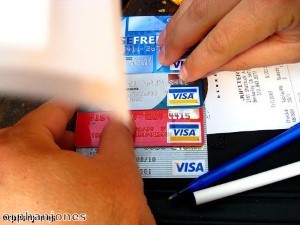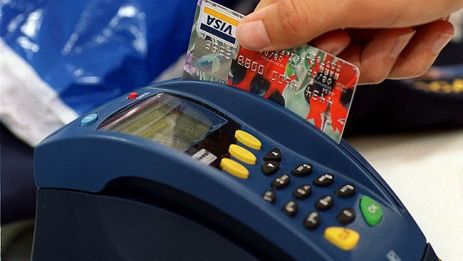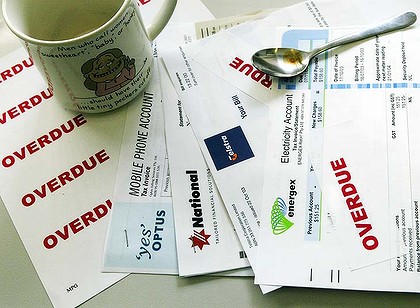 They always make it look so attractive. Their websites are available 24/7, 365 days a year. They offer the full complement of products and services (sometimes). You can pay by credit card or direct debit. Some even deign to offer the flexibility of paying in one lump sum or in regular installments. How efficient and accommodating it all seems. How customer-focussed they make themselves sound. If only the full picture was so appealing.
They always make it look so attractive. Their websites are available 24/7, 365 days a year. They offer the full complement of products and services (sometimes). You can pay by credit card or direct debit. Some even deign to offer the flexibility of paying in one lump sum or in regular installments. How efficient and accommodating it all seems. How customer-focussed they make themselves sound. If only the full picture was so appealing.
And before you can say ‘direct debit service agreement’, you’re being swept away by a tsunami of Credit Card Surcharges, Direct Debit Processing Fees, Account Administration Fees, Payment Processing Fees, Account Handling Fees, Monthly Servicing Fees… the list is endless! There was a time when service providers were happy enough just to receive payment in exchange for services rendered (and maybe whack on the odd ‘Late Payment’ fee if we got a bit slack with our due dates); banks were also once happy enough to offer bank accounts as a safer alternative to stuffing money into tins and under mattresses, a tried and tested option for older people, many of whom still harboured a mistrust of banks until only quite recently. Perhaps that mistrust wasn’t so ill-founded, because these days it seems both our banks and our service providers will create any old excuse to add a surcharge or fee so that, in the end, we’re more-or-less paying for the ‘privilege’ of being able to pay for stuff.
They all do it. Our utilities providers all have little tricks built into their payment arrangements. Ticket agents catch us out with not-negotiable delivery fees. Our big banks still gouge us for almost everything, even after being effectively forced to stop gouging quite so offensively in 2009. Although most of the exorbitant fees of yesteryear have been vastly reduced or eradicated altogether, the raft of basic functions we’re still charged for is staggering. Most of us now pay a fee simply to keep our money in an account designed to keep money in. We then have to give the whole arrangement far more thought than should be required, simply to stay aware of the inherent risk of being charged fees for anything and everything: depositing and withdrawing money over the counter, having a machine count loose change, paying by EFTPOS too often, going to the ATM too often, going to the ‘wrong’ ATM, not putting enough money into our account or taking too much money out of it.
But for some reason most people tend not to make much noise about credit card ‘surcharges’, despite everyone knowing that our biggest financial institutions already make truckloads of profit from credit cards, not least of which from some of the insane interest rates credit cards attract. Typically these ‘surcharges’ are explained away as covering the costs merchants incur for processing the transaction. But some businesses have been making a tidy little profit off the back of these charges by knowingly taking their customers for a ride.
Thankfully, finally, this looks set to change.
The Reserve Bank of Australia’s recent announcement that it was to ‘crack down’ on credit card surcharges couldn’t be more timely. In an age where non-cash transactions have become the norm and where businesses of all kinds increasingly push customers towards online facilities, some have apparently been whacking on credit card ‘surcharges’ of up to 10% of the purchase price, even in cases where there’s no option but to pay online or by credit card. Even though the actual cost of the average credit card transaction is estimated at 0.86% of the transaction total for Visa and MasterCard (which covers the majority of all credit card transactions), there’s never been any regulation of the practice and customers have felt they had little or no choice but to cough up.
 It’s one of the downsides to the online and digital age – fewer people carry significant amounts of cash and there are fewer shop fronts at which to exchange cash for goods and services. 21st Century businesses encourage their customers to conduct the majority of their business either via websites or call centres, with the face-to-face option quickly becoming a thing of the past. But it seems that even paying cash in-store no longer guarantees that what it said on the price tag is what we end up paying.
It’s one of the downsides to the online and digital age – fewer people carry significant amounts of cash and there are fewer shop fronts at which to exchange cash for goods and services. 21st Century businesses encourage their customers to conduct the majority of their business either via websites or call centres, with the face-to-face option quickly becoming a thing of the past. But it seems that even paying cash in-store no longer guarantees that what it said on the price tag is what we end up paying.
Businesses and service providers can call it what they like, but the bottom line is that Australian consumers are being gouged like never before. Everywhere you look, you’re being hit up for some kind of fee for something that probably involves zero human intervention and if it does, it’ll generally be thanks to outdated or inefficient systems and manual processes. So either way they’ll get us for something, whether it’s for the privilege of paying or for the privilege of being sucked into a vacuum of good old-fashioned corporate inefficiency.
To some extent it’s our own fault. Whenever we get to that bit about Terms & Conditions we instantly check the little box to say we’ve read and understood them, without giving it a second thought. In most cases, even if we aren’t intimately familiar with all the fees we could be charged for stuff most of us could rarely claim, hand on heart, to’ve never had the opportunity to find out. The fact that we’re generally scared off by the humdrum, complex nature of the documentation that might’ve warned us about them is, to all intents and purposes, irrelevant. Ignorance of the law is no excuse, and all that.
Take a quick glance through the small-print of this month’s bills, or all those email offers that land in your Inbox each week – it’s all there. Even a basic Google search paints a pretty clear picture.
Take this one from Qantas:
Prices based on payment at qantas.com: by BPAY made at least 7 days before departure; or by Debit MasterCard made within 7 days of departure. For card payments add A$30 per passenger per international booking. Also add A$60 per passenger for international bookings made on 13 13 13 and through Qantas airport locations.
So regardless of whether I pay by credit card, debit card or in cash, it seems I’m going to have to swallow a fee. In all likelihood I won’t pay by cash because I get the impression the only way to do so involves standing at a Qantas counter at my nearest airport; given that every aspect of getting to and from Sydney Airport is a gigantic pain and that parking there for even half an hour would attract yet another exorbitant fee, it’s not exactly on the cards. So I guess I’ll call them – I’ll have to suck up the $30 fee because I have to pay by card, then I’ll have to suck up another $60 fee because I’m going overseas. WTF? As if Qantas’ airfares aren’t already high enough!
Little wonder Qantas was recently served with a ‘please explain’ as to why, among other things, an international airfare booking should attract a flat $30 credit card fee, regardless of whether it’s one-way or return, irrespective of Economy, Premium Economy, Business or First Class. Qantas was asked to explain why it was charging so far above the odds, relative to the average 0.86% merchant service fee. That 0.86% average suggests that for a $1,499 one-way Economy ticket to Los Angeles, the surcharge – if it existed purely to cover transaction costs – should be closer to $13. Meanwhile a customer spending $3,865 on a Premium Economy fare to LA actually pockets a saving of $3 based on the same calculation, while a first class passenger spending $11,298 on their passage to the city of dreams saves more than $67! Qantas clearly has no problem gouging all its customers, with a particular emphasis on those who can least afford it – the same group who just happen to take up more than 75% of available seating on the average international flight.
The amount and variety of fee-incurring options on offer from one of my favourite Australian providers, Telstra, is quite bewildering. But in short:
When you choose to pay your Telstra Bill by credit card, the Credit Card Payment Processing Fee will apply.
Credit Card Payment Processing Fee: If you choose to pay your Telstra bill by credit card, then a payment fee processing fee will apply:
- The rate for MasterCard, VISA and America Express is 1% of the payment amount, plus applicable GST;
- The rate for Diners Club is 2% of the payment amount, plus applicable GST.
To their credit I must acknowledge that Telstra offers a vast array of payment options, they’re reasonably upfront about all the processing fees and they encourage customers to use the best payment option for their personal circumstances. But in the end they still charge a 1% fee for every VISA, MasterCard and AMEX transaction, which is higher than the current merchant average – even if only just.
 But even when organisations are up front about what you’ll be charged, there could still be hidden traps. Some even charge a fee for standard direct debits from bank accounts (i.e. not a credit card), but it’s usually only if you need the flexibility of making smaller, more manageable payments on a more frequent basis – once again, those who can least afford the gouging get the raw end of the deal. Here’s a prime example from the Victorian Employers’ Chamber of Commerce and Industry:
But even when organisations are up front about what you’ll be charged, there could still be hidden traps. Some even charge a fee for standard direct debits from bank accounts (i.e. not a credit card), but it’s usually only if you need the flexibility of making smaller, more manageable payments on a more frequent basis – once again, those who can least afford the gouging get the raw end of the deal. Here’s a prime example from the Victorian Employers’ Chamber of Commerce and Industry:
1.2 A monthly administrative surcharge of $2.75 will be charged for monthly direct debits. No surcharge applies to an annual direct debit.
You can even get caught with something as simple as postage or shipping. A few weeks ago I booked some concert tickets online through Ticketek. At the end of the process, there was no option to collect my tickets from the venue but two options for delivery – standard and registered. Selection of either added $7.95 to my total.
But I shouldn’t tar all businesses with the same fee-fiend brush. This from Brisbane City Council:
Credit card surcharge: All rates payments made by credit card will incur a 0.79% surcharge to reflect the cost of fees charged for credit card transactions. On an average rate account this is $2.96.
So at least someone’s charging less than the 0.86% merchant average and clearly states the fact up-front. Maybe there is a God after all.
So what’s the take out from all of this? What’s the message that businesses and service providers across practically every sector and industry are sending to consumers? Seems to me there are several. But the most important one is that regardless of whether you make payment online, by phone or in person, you’re almost always going to be slugged with a fee or surcharge – whatever they want us to believe, an ‘in person’ surcharge will, bizarrely, exist to cover the costs of conducting face-to-face business via a shop front that serves no other purpose than to allow customers to conduct business face-to-face; an online surcharge will exist purely because you can’t physically stuff money down the phone; and a phone surcharge will cover an organisation’s ‘loss’ because you need to set up a monthly direct debit rather than shelling out thousands of dollars in one hit – the fact that you might be paying in advance of services rendered and not in arrears won’t be deemed relevant.
One way or the other, we’ll always pay for the privilege of paying.
One way or the other, we’ll always be screwed over.
